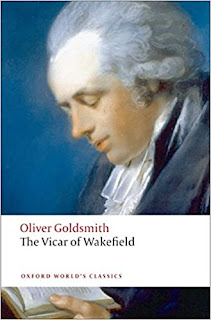The Expedition of Humphrey Clinker
“The
Expedition of Humphry Clinker” is the second book by Tobias Smollett on the
List and, oh boy, is this a step up, both from his first entry and from the
mediocre stuff I have been reading lately.
Tobias Smollett
was a man of comedy and satire, but what he did with “The Expedition of Humphry
Clinker” was to tone down the sarcasm and wittiness and instead embrace a
concept to the extent that it truly comes alive. We follow a group of people as
they travel around Britain, consisting of the bachelor squire Matthew Bramble, his
sister, aging spinster Tabitha, his niece and nephew, Liddy and Jerry and an
assortment of servants, particularly Tabitha’s maid Winifred Jenkins. The story
is their journey and experiences, both with each other and with the places they
pass through. As an interesting and elegant stylistic touch, the story is
written as letters these people are sending back to people they left at home.
In this way we get different viewpoints, often on the same events, as first
(and sometimes second) hand accounts as these people are experiencing them.
Mr. Bramble
is an excitable and hypochondriac patriarch with a good heart but very
opinionated. Likely a cover for the author himself. His viewpoints are rather
settled, there are those things he despise, dirt, stink, hypocritic coxcombs
and insensible management, and there are those he love, which are decent,
honest people, cleanliness and common sense. His letters are often
counterpointed by Jeremy’s letters. His young age allows for a more
unprejudiced viewpoint, especially where Mr. Bramble gets agitated, and he is
the progressive one pointing out absurdities both in his travelling party and in
the environment, they are travelling through.
Tabhita is
described comically is a nightmare of a woman, past her prime and desperately
looking for a husband, she jumps at everything male until refused, at which
point she despise them with a vengeance. She is petty and cheap and very
impressed with herself and therefore an easy mark for hilarity. Liddy is almost
the opposite, a timid young girl who offers a romantic element to the story as
she is wooed by the mysterious Mr. Wilson. Finally, Winifred offers the servant
point of view in letters of poor spelling, misunderstandings but also common
sense.
The story
follows two tracks, one of character development and the second of a travelogue
through 18th century Britain. The character development side to the
story holds some elements of romance and mistaken identity, both favorites of
the era, but it is in the interaction of
these characters that we see the real progression of the characters. Mr.
Bramble learning to appreciate the active life, Jerry to control his temper and
Tabitha finds her match from the most unlikely corner. This is all fun and
interesting, but the satire never crosses the line and become unbelievable. As
original as these characters are, they remain absolutely believable and even
today they are recognizable.
Yet, in my
opinion the travelogue is the greatest asset of the novel. I am not one for
long descriptive parts, but this portrait of 18th century England
and Scotland, as seen from different angles is fascinating stuff. The spa life
in Bath, high society hypocrisy in London, a seaside escape on the Yorkshire
coast, the curious habits of the Scotch such as eating haggis, drinking Whiskey
and playing that weird game they call golf… To sit here in the 21st
century and read an excited description of these well known institutions,
written with a wonder and curiosity of a novel experience is infectious. I
could not get enough of it.
What
impressed be much was how Smollett went from his rambling and inconsistent style
of “Peregrine Pickle” to this super tight and consistent masterpiece and
without losing the astute and humorous perception. I am so used to these “almost-right”
novels of the 18th century that I am frankly surprised at finding
one so well-rounded and polished. There is never too much, the editing is
sharp, but still, it has room for a wealth of detail. He is also able to go
through with his concept down to the details. Each character writes, and writes
consistently, in his particular style with consistent wordings, mistakes and
penchants. You believe Smollett actually visited the places or met people like
those he describes. There is no sloppiness here.
I
thoroughly liked “The Expedition of Humphry Clinker”, one of the best books so
far on the list, and this is certainly a recommendation from me.
And Humphry
Clinker? He is just some dude the party picks up on the way.














